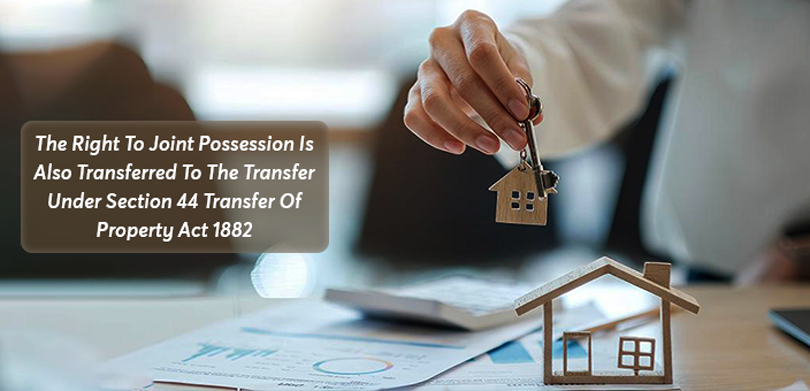Disclaimer:
With 10+ years of experience & expertise in the real estate industry, Homebazaar provides end-to-end property-buying solutions. Hundreds of 100% verified RERA-registered residential & commercial properties are listed on our website. We provide facilities like Zero brokerage, 360° virtual street view, quick site visit services, end-to-end property buying agreements & documentation guidance and low-interest home loan assistance. This helped us gain the trust of 55,000+ clients across India & sold 6,500+ homes of top reputed developers.
Page Contents [hide]
Meaning Of Joint Ownership

Joint ownership of a property is when two or more people jointly own a property. These people should have a relationship between them like company partners, spouses, or others to own a property jointly.
The jointly owned property can be held in different legal forms, including joint tenancy, community property, or in trust.
The joint owners of the property should have equal rights as well as obligations.
Joint Ownership Of Property In India

In India, the Joint ownership or co-ownership of property specifies that there will be equal and undivided interest in the property.
Each of the partners in joint ownership may claim half of the income which is earned from community property.
If any co-owner wants, they can transfer the ownership of that property to another co-owner or any stranger.
This allows the transferee to get the rights and responsibilities of a co-owner. The right will consist of the right to use, the right to possession, and the disposal of the property.
Types Of Joint Ownership Of Property

There are different types of joint ownership of property which are explained in the below points:
- Common tenants: When two or more people jointly own a property but do not declare any share. In this case, all the co-owners can use the property equally and they have an equal share in the property. However, there is no right to survivorship. Hence, if any co-owner dies, then their share will transfer to an individual through a Will to continue to share with other co-owners.
- Joint tenancy: Here the co-owners declare that they will own the property in equal shares. It is a right to survivorship and a right to ownership. Hence, if any owner dies, the ownership is immediately passed to other tenants. There is no divided interest among the owners.
- Tenancy by the totality: This is special joint ownership where the owners are generally spouses. There is half-half ownership of both on the property. Hence, it is important for both co-owners to be married to each other. If any owner dies, the share will be transferred to their spouse. It is not allowed to transfer the share to any other person.
Advantages Of Joint Ownership Of A Flat In A Housing Society

There are many advantages for all the joint owners of a property which are explained in the below points
- Eligibility for loan: If the applicant receives a monthly salary of Rs. 2 lakhs, then banks will offer a loan with an EMI of up to Rs. 1,00,000. If a large sum of money needs to be borrowed, you can apply for the loan because your combined net monthly income qualifies.
- Income tax benefits: It is easier for co-owners of a property to submit a tax deduction claim. Both the principal amount and the interest amount are eligible for a tax deduction. When there is joint ownership, the owners are also exempt from some government taxes, like the state gift tax requirement.
- Equal responsibility: An asset’s individual owners are always accountable for it. They can split the liabilities and benefit from the asset’s advantages.
- Property transfer: According to the rules, if one of the asset’s owners suffers a sudden accident, the asset may be transferred to the other owner. It is possible to transfer without conducting any legal research.
- Sharing profit: Profit distribution must always be equitable. It implies that the third party’s rent payment should be distributed evenly. Whatever the case may be, commercial goods or any other form of income. It is important to share the profits among both the owners.
Risks Of Jointly Owned Property
 Property that is owned jointly or in common has risks. Even while people who are older tend to add other owners to the title of their property as a way to avoid paying attorney costs for estate planning. This can raise the risk of fraud.
Property that is owned jointly or in common has risks. Even while people who are older tend to add other owners to the title of their property as a way to avoid paying attorney costs for estate planning. This can raise the risk of fraud.
For example, a senior citizen with psychiatric illness might consent to add a friend or relative to a shared bank account.
The person will thereafter be able to withdraw their money completely. A person’s addition of any other person’s name to a property’s title is irreversible after it has been made.
A few exceptions, such as fraud or the exploitation of persons who are regarded to be legally incapable of financial gain, can, nevertheless, be pursued in court.
Section 44 Transfer Of Property Act 1882

Under section 44 Transfer of Property Act 1882, if there are two owners of immovable property, and they want to add a third owner to the property, then they can transfer the ownership through Will.
However, it should be noted that both the existing owners will have to relief equal parts of their share to transfer it to the third owner.
This right will also include other common or shared rights of the property, as well as the right to enforce a partition of the same, which are subject to the obligations and conditions during the time of the transfer.
FAQs
| Q1: How many people can be joint owners of the property?
Ans: There can be two or more joint owners of a property as per the law. |
| Q2: Does joint ownership means an equal share of the property?
Ans: Yes, if there is joint ownership, then the owners will have equal rights and responsibilities for the property. |
| Q3: Which are the types of joint ownership of a property?
Ans: There are 3 types of joint ownership of a property which are Common tenants, Joint tenancy, and Tenancy by the totality. |
| Q4: What are my rights as a joint owner of a property?
Ans: You will have equal responsibilities and share over the property. If any owner dies then the share will be divided among other owners. |
| Q5: Can I make my son a joint owner of our house?
Ans: Yes, you can make your son a joint owner of your house through a Will by leaving an equal shared by you and other existing owners. Then he will have equal rights and responsibilities of the property. |







